[bxslider id=”hundreds-observe-world-autism-day”]
 (1)Dislikes
(1)Dislikes (2)
(2)[bxslider id=”hundreds-observe-world-autism-day”]
 (1)Dislikes
(1)Dislikes (2)
(2)A ban on foreigners working as cashiers took effect today in an attempt to boost employment among local young people, almost a third of whom are jobless.
However, overseas workers were still seen working as cashiers, while some employers said they had trouble finding young Maldivians to fill the roles.
The Ministry of Economic Development changed the regulation on migrant workers earlier this year to bar foreigners from working as cashiers in cafés, restaurants and shops.
The ministry also began free training programs in collaboration with businesses for Maldivians wishing to be cashiers, but some businesses remain unprepared for the change.
“My boss came today because I can’t work behind the counter anymore,” said an migrant worker who was previously a cashier at Mariyam Café in Malé.
He is still employed at the cafe but will take on a different role.
Although the new regulation aims to increase employment among young Maldivians, some businesses have experienced problems with younger local staff.
“I employed three or four [Maldivian] youths before. But I can’t manage the business with them because they do not come to work regularly,” said Mohamed Sanah, who runs Laasany, a family-run shop on Orchid Road in the capital.
Ali jaleel, owner of a local goods shop, praised the change in the rules.
“I’m the one who is always behind this counter,” he said. “I see a lot of foreigners working as cashiers.
“It would be a good change for Maldivians to do the job instead of them. At least the money wouldn’t go outside the country then.”
Some 26.5 per cent of Maldivians aged 15 to 24 are unemployed, according to World Bank figures from 2013, the most recent figures available.
Government figures place the number of overseas workers in the Maldives at 58,000, but other estimates place as high as twice that figure. Most are in the construction industry.
The Ministry of Economic Development and Youth Ministry were unavailable for comment at the time of going to press.
President Abdulla Yameen pledged to create 95,000 jobs in his five-year term. He claimed 17,000 jobs were created within his first year, and claimed credit, but did not provide details.
 (0)Dislikes
(0)Dislikes (0)
(0)Hundreds of citizens from Male’ and Thulhaadhoo created cards for former president Mohamed Nasheed over the past week in events organised by MDP supporters.
Locals from Baa atoll Thulhaadhoo made cards for Nasheed on Saturday at an open event. The organisers will send the cards to the family of Nasheed, who was sentenced to 13 years in jail this month on terrorism charges over the detention of the chief judge of the criminal court while Nasheed was in power.
Last Wednesday, about 200 children gathered at Raalhugandu in Henveiru district in Male’ to make cards for Nasheed, whose trial was heavily criticised by groups including Amnesty International.
Toddlers, pre-teenagers and also young teenagers took part in the event. Some had brought cards from home while others sat down to make them at Raalhugandu.
The idea for the event came because family members of Nasheed, nicknamed “Anni”, have been receiving numerous hopeful and inspiring messages from the children about their hero, “Annibe” (Anni brother), through their parents, so a team from the MDP decided to organise a card making evening for children.
“We will free you, we will defeat the bad guys,” read a card made by Aabi, a nine-year-old boy.
Nasheed’s legal team has argued he was not given a fair trial, while bodies including the United Nations and Amnesty International have heavily criticised the process that led to his imprisonment. However, the government insists it was a fair trial conducted in accordance with local law.
Speaking to Minivan News, an eight-year-old boy named Zain said that Nasheed taught him how to play chess, and that he wants to have dinner with President Nasheed.
“Thirteen years is so long, I want to have dinner with you sooner,” wrote Zain.
Another card from Kyle, aged three, read: “Give my president lots of love and strength”, with a picture of Nasheed holding him when he was a few months old.
Speaking to Minivan News, MP Eva Abdulla, Nasheed’s cousin, said that some of the cards said things like “He is our hope”, “Come back soon” and “We miss you”.
“For us, what they have to say is very touching, even though at times it is emotionally draining for us, it is very nice to see these things and it gives us hope,” said Eva.
Fourteen-year-old Ana and 15-year-old Raayaa told Minivan News they would like to say, “Please free President Nasheed as soon as possible”.
“I am very sad he is in jail, he is not a terrorist,” said nine-year-old Eashaal on her card.
Eva said on Wednesday that lawyers and his family were working towards a way to take the items to Nasheed, who is currently being held at the Dhoonidhoo detention centre. Eva said that Nasheed has always had a “very good rapport” with children.
“He will be very happy to receive these, he loves children and if he could, he would definitely write back to each and every one of them,” said Eva.
Aina Ibrahim, 14 years old, gave her card to Zaya Laila Nasheed, President Nasheed’s youngest daughter.
“He fought for rights, freedom and justice in our country. He has made so many contributions and so much has been done, unlike during the autocratic rule,” she said.
Nasheed’s mother was also at Raalhugandu to collect the cards, along with other family members.
Nasheed has been arrested and detained dozens of times since he began campaigning for democracy in the Maldives.
“I grew up writing letters to him in jail and now my children are writing to him in jail. Children from the whole nation are writing to him in jail,” said Eva.
 (0)Dislikes
(0)Dislikes (0)
(0)Following an incendiary Friday sermon warning unjust judges of hellfire, thousands gathered outside the Islamic Center in Malé at noon and prayed for former President Mohamed Nasheed and former Defence Minister Mohamed Nazim’s freedom.
Dozens of police officers attempted to disperse the congregation before the prayer began, but later watched on until the prayer was completed. The police then cordoned off the area.
The sermon, issued by the Ministry of Islamic Affairs, quoted several verses from the Qur’an and hadiths from the Prophet Mohamed’s Sunnah on the importance of delivering just verdicts and the wickedness of false testimony.
The unusually incendiary sermon comes in the wake of an 11-year jail term for Nazim on charges of smuggling weapons, and a 13-year jail term for Nasheed on charges of terrorism over the military detention of a Criminal Court judge.
The opposition has claimed the trials were unjust and marred with irregularities including the Criminal Court’s refusal to call defence witnesses and to allow adequate time and facilities to mount a defence.
Nazim maintains he was framed by rogue police officers on the orders of Tourism Minister Ahmed Adeeb, a claim the police and Adeeb have denied. Defence lawyers said prosecution’s witnesses had lied in court, and said the judges had violated the ex-defence minister’s right to defence.
Reading out the prepared sermon, Imams across the country said upholding justice was necessary for progress and the establishment of peace and order. Islamic Empires had progressed because they were founded on justice, they said.
Quoting from Surat al-Nisa, the sermon said: “Allah commands that you should render back the trusts to those to whom they are due; and that when you judge between men, you judge with justice.”
The sermon also urged judges to be fair, consider both sides of the argument and evidence in delivering a verdict. Providing false testimony is among the greatest of sins, it added.
Quoting from Prophet Mohamed’s Sunnah, the sermon said: “Judges are of three types, one of whom will go to Paradise, and two to Hell. The one who will go to Paradise is a man who knows what is right and gives judgment accordingly; but a man who knows what is right and acts tyrannically in his judgment will go to Hell; and a man who gives judgment for people when he is ignorant will go to Hell.”
Religious conservative Adhaalath Party’s scholars control the Islamic Affairs Ministry. The party recently withdrew support for President Yameen’s administration, and joined Nasheed’s Maldivian Democratic Party (MDP) under the banner “Alliance Against Brutality.”
The alliance has been organising daily protests in Malé.
After the sermon ended, the congregation of men and boys gathered outside the Islamic Center, adjacent to the military barracks and offered a prayer for Nazim and Nasheed: “Our beloved leader, a man loved by a majority of us, Mohamed Nasheed, has been unjustly sentenced and imprisoned. He has suffered and continues to suffer brutality. O Allah! Save Mohamed Nasheed from jail and keep him safe. Bless us in our work to establish peace and security in our country, and make us victorious.”
“Colonel Mohamed Nazim, a man who has dedicated his life to serving our people, has been falsely accused and unjustly imprisoned. Protect Mohamed Nazim and all Maldivians who suffer injustice.”
Opposition supporters last week also offered a similar prayer at the Islamic Center, prompting Home Minister Umar Naseer to call for police action against using mosques and surrounding areas to “make political statements.”
Dozens of opposition supporters on Baa Atoll Thulhadhoo Island also prayed for Nazim and Nasheed yesterday.
RaeesNasheed ge Minivan kamaai Salamathaai Rahkaatherikamah kurevey KHASSA DHUVAA B.Thulhaidhoo gai miadhu kohfi pic.twitter.com/CIml2coSeJ
— 105k (@Nishantha28) March 27, 2015
The alliance meanwhile held a march attended by hundreds in the afternoon and a rice pudding banquet at Raalhugandu area at night in Malé. There were protest marches on Thulhadhoo and Gaaf Alif Atoll Kolamafushi as well.
People are clearly not intimidated. Protests in other islands. Gaaf Alif Kolamaafushi. #FreeNasheedNow pic.twitter.com/ikirWTACiV
— Shauna Aminath (@anuahsa) March 27, 2015
Maldivians stand up against brutality. Calling for justice, release of President Nasheed. Baa Atoll, Thulhaadhoo. pic.twitter.com/XxMC4dFbju
— Shauna Aminath (@anuahsa) March 27, 2015
 (0)Dislikes
(0)Dislikes (0)
(0)The Department of Immigration and Emigration today warned migrant workers against participating in protests and threatened to cancel work visas for protesting expatriates.
The warning came after local media today announced migrant workers had called for a mass protest on Friday against entrenched discrimination and a recent spike in violence which saw two Bangladeshi nationals murdered and three stabbed in Malé.
A 25-year old Bangladeshi, Shaheen Mia, was stabbed to death in a Malé café in the early hours of the morning on Sunday (March 22), while a Bangladeshi national identified as Bilal was found dead in Alif Alif Atoll Thoddoo Island on Monday night.
Meanwhile, three expatriate workers were stabbed on Tuesday between 7:20pm and 7:40pm in three different locations in Malé.
But the Controller of Immigration and Emigration Mohamed Anwar in a statement today said expatriates protesting for their rights was against the terms of their work permits, and threatened to cancel visas without a second warning.
If action was taken against an expatriate worker for protesting, Anwar said the Immigration Department would also suspend services to their employers.
He called on employers to remind migrant workers to respect Maldivian laws and stay away from protests.
“The immigration department will not hesitate in penalising those who participate in protests,” he added.
The Human Rights Commission of the Maldives’ (HRCM) Vice President Ahmed Tholal said the ban on migrant worker protests was unconstitutional.
“The constitution guarantees every person on Maldivian soil the right to protest. A clause in a migrant worker’s contract cannot override the constitution,” he told Minivan News.
Expressing grave concern, Tholal said the recent fatal attacks amount to hate crimes as the violence appears to be targeted against migrant workers.
He noted discrimination and inhumane treatment of migrant workers were entrenched issues in the Maldives, and said this week’s violence further marginalised an already vulnerable group.
Tholal called on the Maldives to immediately initiate discussions with diplomatic missions and take urgent action to ensure the safety of migrant workers.
According to the 2014 national census, there are 58,683 migrant workers in the Maldives. However, the department of national planning said the figure was much lower than the official figure recorded by the Immigration Department.
The US State Department in its 2014 Trafficking in Persons report described the Maldives as a “destination country for men, women, and children subjected to forced labor and sex trafficking.”
Migrant workers – primarily Bangladeshi and Indian men in the construction and service sectors – experienced forced labor, including fraudulent recruitment, confiscation of identity and travel documents, withholding and nonpayment of wages, and debt bondage, the report said.
The State Department welcomed the Maldives passing its first anti-trafficking law in 2013, but decried “serious problems in anti-trafficking law enforcement and victim protection.”
“The government did not adequately train police and other officials on trafficking, nor did it provide authorities with procedures to identify victims among vulnerable populations and refer those victims to protective services. Consequently, the government penalised some victims for offences committed as a result of being trafficked and also deported thousands of migrants without adequately screening for indications of forced labor,” the report said.
Following the enactment of the Anti-Human Trafficking Act in 2013, the Maldives avoided relegation to Tier 3 and possible international sanctions.
Human rights group Transparency Maldives (TM) has also described the Immigration Department’s protest ban as unconstitutional and called on the government to listen to worker’s concerns.
TM also urged law enforcement agencies to expedite investigations into migrant worker murders and called on the government to sign the International Covenant on Migrant Workers immediately.
 (0)Dislikes
(0)Dislikes (0)
(0)Additional reporting by Hassan Mohamed
A number of families have been forced out of their homes after a massive fire broke out in a warehouse in Malé on Thursday night (March 19), sending plumes of flame and smoke 60 feet into the air.
The two-storey Lily Store warehouse in Maafanu ward was completely destroyed, causing damages worth an estimated MVR30 million (US$1.9 million), according to Lily Store owner Ahmed Naseer.
Homes in the area were evacuated around 11:15pm as the flames leapt from Maafanu Oak Villa to adjacent buildings in the narrow alley. Residents first heard loud cracking noises like gunfire or explosions before the flames were visible.
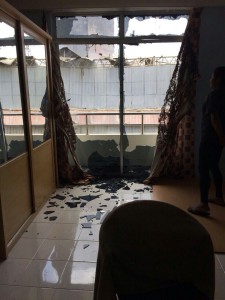
Deodorant bottles, gas cylinders, one lorry, and three pickups were inside the warehouse.
All the windows of the multi-storey building opposite the warehouse were shattered and deodorant bottles were later found inside its apartments.
According to the Maldives National Defence Force (MNDF) fire and rescue service, the fire was contained around 12:00am and completely extinguished about two hours later with members of the public working alongside police officers and firemen.
Fire lorries were unable to use water cannons for nearly 30 minutes with the narrow streets surrounding the warehouse packed with panic-stricken and fleeing residents.
Residents from the neighbourhood told Minivan News that many people emerged from their homes in night dresses, and some were carrying crying toddlers.
Aftermath
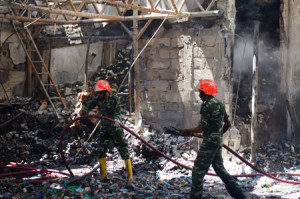 On Saturday morning, smoke was still spewing out of the burnt-down warehouse.
On Saturday morning, smoke was still spewing out of the burnt-down warehouse.
The fire had spread to the third floor of an adjacent building as well as a construction site whilst the roof of a nearby house had collapsed.
The apartment now lies in ruins and many houses were looted after residents fled.
Malé City Councilor Shamau Shareef said a family of ten was sheltering at Malé’s Social Centre with the neighbourhood home to about 500 people still engulfed in smoke.
Shamau said about four families were forced out of their homes with their buildings uninhabitable, walls still scalding hot and belongings burnt.
The opposition Maldivian Democratic Party councillor called on MNDF and police to expedite cleaning up the area as the “toxic fumes are not safe to breathe.” He also urged the government to provide temporary shelter to the four affected families.
However, Shamau commended the MNDF and police both for their prompt response and safely evacuating the neighbourhood.
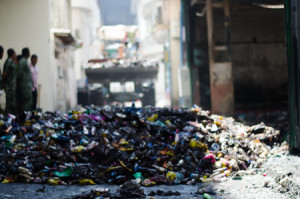 Apart from an elderly man reportedly treated at the Indira Gandhi Memorial Hospital for smoke inhalation, no one was harmed in the fire.
Apart from an elderly man reportedly treated at the Indira Gandhi Memorial Hospital for smoke inhalation, no one was harmed in the fire.
A middle-aged woman seeking refuge at the social centre told Minivan News that the explosions she heard “sounded like gunfire.”
“We were all sleeping when the fire broke out. I was woken up by very loud explosions. Soon someone started knocking on the door loudly and asked us to evacuate,” she recalled.
“My child still is only eating now, yesterday he barely ate anything and had trouble sleeping,” she said, pointing to her 13-year-old son having biscuits and tea at the social centre’s small cafeteria.
She expressed gratitude to the Disaster Management Centre for arranging temporary shelter and providing food and other essentials.
“I understand it is a difficult time for everyone. We do not have all the luxuries we had at home. But I am happy with what they have done for us,” she said.
A resident of the neighbourhood, Ali Rasheed, 52, said his family has been sleeping and eating at friend’s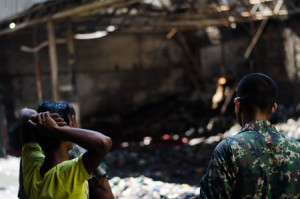 places as living in their home was “unbearable” because of the smoke.
places as living in their home was “unbearable” because of the smoke.
“I believe the government should be held accountable for this. The fire trucks were not able to provide water until much later,” he said.
Lily Store owner Naseer told local media that nothing was salvaged from the warehouse, which he said was stored with newly imported goods ten days ago. However, the warehouse was insured, Naseer said.
Vice President Dr Mohamed Jameel Ahmed visited the damaged homes this morning.
Suspected arson
A police media official confirmed today that a separate fire occurred at Ekuveni around 12:00am on Thursday night, less than an hour after the warehouse fire broke out.
Police began patrolling the city whilst MNDF officers were deployed to petrol sheds and other strategic locations.
A security guard at the sports complex told Minivan News that he saw two “youngsters on a motorcycle” hurl what appeared to be petrol bombs into the premises. However, the fires were quickly extinguished.
“I immediately called the police and started working on extinguishing the fire,” he said.
The second fire fueled speculation of coordinated attacks, and police have not ruled out arson in the warehouse fire, saying all lines of inquiry were open in the ongoing investigation.
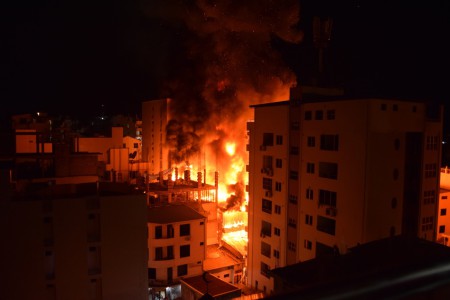
“We are working hard to identify those involved in the dangerous fire in Malé on Thursday night, and will take strict action against them,” Police Commissioner Hussain Waheed wrote on Facebook today.
Cover photo by Laisha Mohamed Shakir
 (0)Dislikes
(0)Dislikes (0)
(0)A group of local artists staged a protest at the national art gallery today over the exclusion of paintings depicting former President Mohamed Nasheed from an exhibition organised by the education ministry.
The exhibition, launched yesterday, featured artwork and handicraft by students from 32 schools as part of events planned by the government to mark the upcoming golden jubilee of the country’s independence.
“Nasheed is said to be the Mandela of the Indian Ocean and I personally have a lot of respect for him. That is why I chose to paint him,” 18-year-old Mohamed Raaif told Minivan News today.
The Maldives National University student explained that his painting was initially put up, but he later discovered that it had been removed.
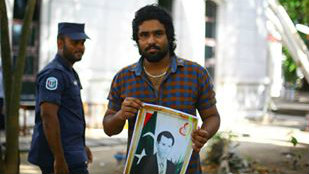
Raaif said a teacher told him that the organisers claimed his painting was of “a terrorist” and could not be displayed.
The opposition leader was found guilty of terrorism on Friday night (March 13) and sentenced to 13 years in prison over the military’s detention of Criminal Court Chief Judge Abdulla Mohamed in January 2012.
Education ministry officials in charge of organising the exhibition could not be reached at the time of publication.
A second painting by a student featuring the former president was also removed.
However, artwork featuring other politicians with blurred faces were displayed at the exhibition.
Raaif said he spent three days working on the painting and had stayed up all night to complete it. He said he was hoping to raise funds for his mother’s backbone surgery as the family was currently facing financial constraints.
He added that he did not have any intention of politicising the painting. However, Raaif said he associated the theme of the exhibition – freedom or independence – with former President Nasheed.
“Not free yet”
Online news outlet CNM reported that the second banned painting of Nasheed was from a grade ten student at the Addu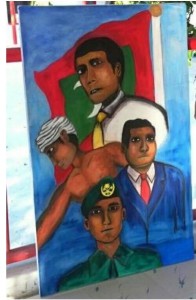 City Feydhoo School.
City Feydhoo School.
“That photo is of a terrorist. Photos of terrorists cannot be promoted,” organisers allegedly said, according to an anonymous source.
Meanwhile, a group of about 30 people, including several artists, staged a silent protest inside the art gallery today, mingling with members of the public and holding up prints of the banned Nasheed paintings.
The exhibition was open to the public with free entrance.
The protesters also carried placards calling for freedom of expression and assembly as guaranteed by the constitution and stuck posters on the gallery walls that read, “Not free yet!” and “Minimum 50 years in prison.”
“The function of freedom is to free someone else,” read one of the posters, quoting Chinese dissident and Nobel laureate, Ai Weiwei.
“The work of art was a scream for freedom. Minivan [independent] 50 has not reached us yet!” read one of the placards held up by a protester.
An artist at today’s protest, Kareen Adam, told Minivan News: “The state cannot dictate to us what we can paint, draw, write or think etc. They should have called this exhibition ‘freedom within boundaries’ instead.”
Others artists said the organisers were sending a negative message to youth by banning the paintings of Nasheed, stating that former President Nasheed was an ineradicable part of recent Maldivian history.
Around 4:30pm – half an hour after the exhibition opened for the day – protesters told Minivan News that police asked them to leave as organisers had said the art gallery was closing.
A group led by Youth Ministry Coordinator Ali ‘Steps Ayya’ Shahid meanwhile arrived and began tearing down the material pasted on the walls.
“We will not keep paintings of terrorists,” one of the men allegedly said.
Protesters said the men tore down the paintings and ripped up the posters as police officers watched impassively.
A police officer was also photographed ripping a poster.
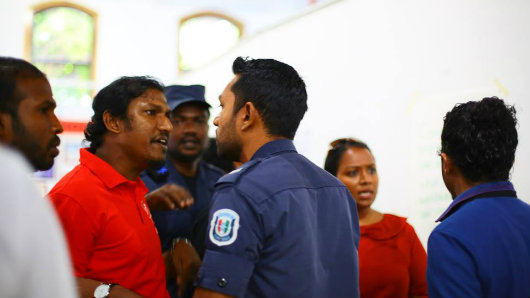
Police told the protesters that the men had clearance to enter the gallery as they had passes of government coordinators.
One of the protesters took a photograph of the men and was allegedly pushed away.
The men also pushed out the protesters from the gallery. Protesters who spoke to Minivan News asked not to be named as they feared becoming targeted and said they did not have confidence that police would provide protection.
Step Ayya & Harrins Ammadey in Action. Coordinator inge Job description ga himeney kan @pink_steps @vaitheyoammadey pic.twitter.com/0y6sha9kFz
— JP Male’ City (@JP_Male) March 17, 2015
Related to this story
Former President Nasheed found guilty of terrorism, sentenced to 13 years in prison
Government will ensure Nasheed’s right to appeal conviction, says spokesperson
Respect Criminal Court verdict, says President Yameen
 (0)Dislikes
(0)Dislikes (0)
(0)The government will submit legislation on gender equality during the ongoing first session of the People’s Majlis for 2015, Attorney General (AG) Mohamed Anil has said.
Speaking at a function held at the Islamic Centre yesterday to mark International Women’s Day, AG Anil – who also heads the Ministry of Law and Gender – said the bill would protect women’s rights, empower women socially and economically, and ensure equal rights.
Anil said the government has undertaken significant efforts to promote women’s rights and “eliminate obstacles” faced by Maldivian women.
“Of the total 926 members of the Ministry of Economic Development’s Sabah project, I note happily that 91 percent are female members,” he said.
He added that 60 percent of the Ministry of Fisheries and Agriculture’s commercial loan scheme would be earmarked for women and youth.
The government has also formulated and enacted rules for operating daycare centres to assist working mothers, Anil said, adding that an amendment would be submitted to tax laws to exempt the centres from GST.
Efforts were currently underway to establish safe houses in each atoll for victims of domestic violence, he added.
Safe houses or temporary shelter have so far been set up at the Family and Children Service Centres in Haa Dhaal Kulhudhufushi, Shaviyani Fonadhoo, Thaa Veymandoo, and Gaaf Dhaal Thinadhoo, Anil noted.
Anil said there was no discrimination between boys and girls in the education sector, noting that 70 percent of graduates from the National University in March 2014 were female.
In its concluding observations released last Friday (March 6) on the combined fourth and fifth periodic reports of the Maldives, the UN Committee on the Elimination of Discrimination against Women welcomed legislative reforms such as the Sexual Harassment and Abuse Prevention Act of 2014, the Sexual Offences Act of 2014, the Prevention of Human Trafficking Act of 2013, and the Domestic Violence Prevention Act of 2012.
The Maldives acceded to the UN Convention on Elimination of Discrimination against Women (CEDAW) in July 1993
The committee also noted the establishment of the Family Protection Authority in 2012 and welcomed “forthcoming amendments to the Family Act to regulate the distribution of matrimonial assets upon divorce.”
In his presidential address at the opening of parliament earlier this month, President Yameen said the legislation would protect women’s rights in divorce cases as pledged during the presidential campaign.
The CEDAW committee meanwhile noted “that the principle of equality between women and men is not yet explicitly enshrined in legislation” and called on the state to ensure that the gender equality bill includes a definition of discrimination on the basis of sex.
The committee also expressed concern about “the delay in conducting a gender impact analysis of some of its existing laws, including family law provisions which continue to indirectly discriminate against women, and in adopting regulations necessary for the full implementation of the Domestic Violence Prevention Act and the Prevention of Human Trafficking Act.”
Insufficient progress
Meanwhile, in a press release yesterday, the Human Rights Commission of Maldives (HRCM) said the Maldives has not achieved or made adequate progress under the Millennium Development Goal of ensuring equal rights for women.
Referring to its shadow report to the CEDAW committee last year, the commission said it had noted the underrepresentation of women in decision-making as well as the minor role of women in economic development.
The report noted that some police officers believe violence against women was caused by women failing to fulfil their duty as submissive wives.
The HRCM also contended that women were not receiving full protection under the new domestic violence, sexual offences, and sexual harassment laws, noting that regulations required under the domestic violence law have yet to be enacted two years after it was passed.
“Despite domestic violence cases being reported, we note that that relevant state institutions are not taking action in accordance with the obligatory rules for such cases,” the HRCM press release stated.
The commission also stressed the importance of expediting the passage of the gender equality bill and appealed to the executive to allocate sufficient funds and resources for institutions responsible for protecting women’s rights.
“Awareness also needs to be raised among girls regarding their physical and reproductive health,” the press release continued.
“To achieve this, we appeal for both further widening the role of state institutions and civil society organisations and instilling the spirt of working together.”
The slogan for this year’s International Women’s Day is ‘Empowering Women – Empowering Humanity: Picture it!’
Related to this story
Some police officers believe women to blame for domestic violence, says HRCM
 (0)Dislikes
(0)Dislikes (0)
(0)The UN Committee on the Elimination of Discrimination against Women has welcomed the Maldives’ progress on protecting women’s rights whilst expressing concern with child marriages, flogging and gender stereotypes in society.
In its concluding observations released last Friday (March 6) on the combined fourth and fifth periodic reports of the Maldives – reviewed at meetings on February 27 with a high-level delegation led by Foreign Minister Dunya Maumoon – the committee welcomed progress achieved since the last review in 2007, including the adoption of a new penal code that includes a definition of rape.
The committee noted other legislative reforms such as the Sexual Harassment and Abuse Prevention Act of 2014, the Sexual Offences Act of 2014, the Prevention of Human Trafficking Act of 2013, the Domestic Violence Prevention Act of 2012, the Employment Act of 2008, and the new Constitution in 2008, “which removes provisions barring women from being elected as President and Vice-President.”
The committee also noted the establishment of the Family Protection Authority in 2012 and welcomed “forthcoming amendments to the Family Act to regulate the distribution of matrimonial assets upon divorce.”
The Maldives acceded to the UN Convention on Elimination of Discrimination against Women (CEDAW) in July 1993 with reservations to article 16, which deals with equality in marriage and family relations.
“We strongly believe that equality of women in all walks of life, within the family, and in public life, is indeed a prerequisite for social justice and inclusive development that benefits all segments of society,” said Foreign Minister Dunya in her opening remarks at the treaty reporting session.
She reiterated the government’s commitment to addressing emerging challenges such as stereotypical practices that hinders equal representation of women in society.
Issues of concern
Whilst welcoming legislative initiatives on improving access to justice, the committee expressed concern with “persistent barriers faced by women in accessing justice”.
Of particular concern was the “insufficient independence of the judiciary, bias and gender stereotypes among judges and law enforcement officials, the absence of gender sensitive procedures and the limited capacity of the police to deal with complaints from women about violations of their rights in a gender-sensitive manner.”
Noting “the high number of unregistered marriages in rural and remote areas, including child marriages,” the committee recommended setting an age limit of 16 for exceptional cases of underage marriages.
The committee also recommended the abolition of flogging for fornication “as a matter of urgency,” noting that flogging “disproportionately affect women and girls and deter them from reporting sexual offences.”
Moreover, the committee noted the “existing discriminatory provisions regarding the participation of women as witnesses and delays in amending the stringent evidentiary provisions required for sexual violence offences.”
The committee noted that marital rape was not criminalised in law, the lack of enforcement of the anti-domestic violence law, and the lack of resources for the Family and Child Service Centres and safe houses.
The committee suggested that social stigma attached to women who report abuse as well as the perception that domestic violence cases were private family matters deters reporting.
Traditional stereotypes regarding the role and responsibilities of women in society meanwhile remain deeply entrenched, the committee observed, “which overemphasise the role of women as wives, mothers and caregivers, as well as prevent them from asserting their rights and actively participating in decision-making and other aspects of political and public life.”
The committee also expressed concern at “the growing trend in conservative interpretations of religion which encourage stereotypical patterns which negatively impact women and girls, as acknowledged by the State party during the dialogue. The Committee is further concerned about the emergence of cases of female genital mutilation in the State party, despite legislative prohibitions.”
Stereotypes as well as geographic constraints also limit girls’ access to higher education, the committee observed, noting “de facto restrictions on the re-entry of pregnant adolescent girls and married girls under the age of 18 in the formal educational system.”
Whilst noting the high representation of women in political parties, the committee noted that “social and cultural barriers continue to stigmatise women wishing to participate in political and public life which prevent them from running for public office.”
The committee noted the underrepresentation of women in parliament, the executive, the judiciary and decision-making level posts in the civil service.
“Further, it regrets the limited participation of women in local governance at community level, in particular in atolls, islands and city councils,” it stated.
On anti-trafficking, the committee expressed concern over “delays in establishing shelters for victims of trafficking and the absence of procedures for early victim identification, case management, and victim protection” and noted the “risk of internal trafficking for women and girls from remote islands placed in households in Male to access higher education opportunities.”
On health issues, the committee noted “limited access to obstetric health services, including pre- and post-natal services, for women living in remote areas,” “restricted access, in practice, to sexual and reproductive health services, for unmarried women and girls,” and “the absence of a study and data on the prevalence of unsafe and illegal abortion which is reportedly increasing.”
Reservations
The committee urged the Maldives to honour its commitment to withdraw its reservation to paragraph two of article 16, which states: “The betrothal and the marriage of a child shall have no legal effect, and all necessary action, including legislation, shall be taken to specify a minimum age for marriage and to make the registration of marriages in an official registry compulsory.”
The committee also recommended a review of the reservation to paragraph one of article 16, “with a view to fully withdrawing it, taking into consideration practices of countries with similar religious backgrounds and legal systems which have successfully harmonised their domestic legislation with international human rights obligations”.
Despite its ratification in 1993, the committee noted that the convention “has yet to be incorporated into its domestic legal system and can therefore not be applied by the courts” and expressed concern with the delay in conducting a gender impact analysis of existing laws.
The committee called on the state to pass gender equality legislation with a definition of discrimination in line with the convention.
Referring to the restructured Ministry of Law and Gender headed by the Attorney General, the committee said the move “weakened [the national machinery’s] institutional capacity to develop coherent and sustainable plans and policies and to ensure effective gender mainstreaming across relevant sectors” and expressed concern about the “the insufficient financial, human and technical resources” available to the ministry.
On the Supreme Court’s suo moto proceedings against members of the Human Rights Commission of Maldives (HRCM) concerning its submission to the UN Human Rights Council’s Universal Period Review last year, the committee said “such actions seriously undermine the independence of the commission.”
Related to this story
Amnesty calls for moratorium on flogging in Maldives
Some police officers believe women to blame for domestic violence, says HRCM
Supreme Court slams HRCM for basing rights assessment on “rejected” UN rapporteur findings
 (0)Dislikes
(0)Dislikes (0)
(0)